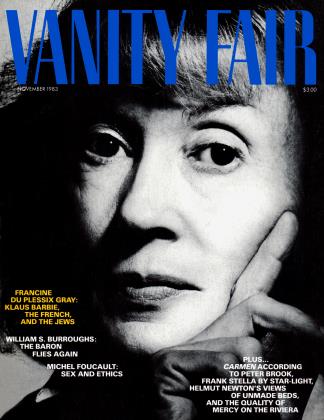Sign In to Your Account
Subscribers have complete access to the archive.
Sign In Not a Subscriber?Join NowEAST-BLOC PARIS
GOING OUT IN
Budapest: High Marx for hedonism
Let me tell you a joke that will make everything clear," said the portly Hungarian banker over two plates of gulyas, one plate of fogas, and two plates of kolozsvari rakottkaposzta, a dish whose iname and appearance had prevented my probing its cabbageshaped boiled body. We were sitting with friends in Gundel's, an old Budapest restaurant, famous for its non-nouvelle cuisine.
Here's his joke, boiled down a bit. (Hungarians are loquacious.) Andropov, Reagan, and Kadar, Hungary's dour-faced head of state, are heading for a meeting so secret not even their drivers know the location. So the morning of the momentous meeting, Andropov and his chauffeur arrive at a fork in the road, and the baffled driver asks him which turn to take. "To the left, the left, comrade driver," commands Andropov. A few minutes later Reagan arrives at the very same spot, and his driver asks him the same question. "Bear right, of course," smiles Reagan. And along comes Kadar, and his driver also stops and says, "Please, which way?" Looking furtively over his shoulder, Kadar whispers, "Signal left, but go right." That is perhaps not the funniest joke this side of Moscow, but I'd just come from a weeklong sojourn among the pod people of East Germany, where facial movements of any sort are verbo- ten and even Karl Marx redivivus would have to line up for a greasy sausage meal. In that context the banker was one jolly fellow, Gundel's a culinary paradise, and Budapest a rose among Warsaw Pact weeds.
In 1956 Soviet tanks putting down the widespread anti-Communist revolt nearly bulldozed Budapest off the map. But since then, with crusty old Kadar leading the way, the Magyars have been executing an adroit soft shoe and shuffle along the old Moscow highway while gazing lovelorn, hat in hand, at the Western world. When you walk through Budapest, the difference between this city and others in the Soviet vise, say Prague or East Berlin, is breathtaking. Increased privatization and incentives have turned many Hungarians into worker bees with spare forints. "What's going on?" wondered my travel companion. "Don't these people know they're supposed to be on line?"
Here we were on Vaci utca, the main shopping street, and there wasn't anybody waiting to get a kilo of beets or a slice of salami. Even more amazing, stores were well stocked, not just with necessities but with the pleasurable extras of life—books and records, for instance, cakes and excellent local wines. In a spacious turn-of-the-century market hall, peaches were practically a dime a dozen, and one stand offered a markdown on raspberry juice. While I wouldn't suggest Budapest as the place to pick out a spring wardrobe—Hungarians don't accessorize—at least there weren't many shabby, sallow adults trudging along the street wearing outfits they hoped to grow into.
Among the more than two million people in Budapest not a few are bitter about the lack of a free press and the restrictions on travel. But history has taught the Hungarians a long bloody lesson in endurance. They've survived 150 years of Turkish occupation and 200 years of Austrian domination, and even a casual glance around Budapest suggests it will never be pressed into a rigid Marxist mold.
Instead of Communist posters, huge ads for Jezus Krisztus Szupersztar decorated the streets near the Danube River, which still slices the city into a hilly Buda and a flat Pest (joined politically in 1873). "Two cities for the price of one," noted my bemused travel companion.
Hungarians like to call Budapest the Paris of the East bloc and they aren't totally mad. Broad tree-lined avenues give Pest a spacious elegance. Restaurants and cafes make it lively. Unlike the East German government, which permits few cafes, the Hungarian government apparently doesn't consider cafes a breeding ground for dissent.
Seated outdoors one afternoon, at the venerable Vorosmarty cafe, I nearly choked on a marzipan oyster, watching an incredibly Rabelaisian scene two tables away, where an East Berlin group was gathered with enough pastries on their plates to feed the entire KGB. You expected whipped cream to come out of their ears any minute.
One tends to go out a lot in Budapest, and I spent my last evening at a nightclub with another banker. (For a Communist country, Hungary has an awful lot of bankers; but since Hungarian bankers devote a good deal of their time to wheedling millions of dollars out of the IMF, they tend to be more creative and charming than is typical of that breed.) Anyway, there we were, listening to the star attraction, an East German yodeler, and the banker is telling me how terrific the new bond market is, how private incentives are invigorating agriculture, and that "soon maybe we'll start a stock market, like in the old days" (when Budapest had a stock exchange building bigger than Wall Street's). "Where are you going to build it?" I ask. "No place," he says. "No need for a symbol—too provocative. We'll probably open a few offices in the bank."
The yodeler departed, leaving the stage to a skinny juggler who came on with several trays of lavender crystal and a big dagger. He put the dagger in his mouth, balanced the trays on the dagger, and then strapped himself onto a vertical lazy Susan and proceeded to spin around without dropping the merchandise.
Similarly, the Hungarians survive, doing a balancing act between Communism and capitalism and looking a little fatter and happier than their Soviet brethren.
MANUELA HOELTERHOFF
 View Full Issue
View Full Issue






Subscribers have complete access to the archive.
Sign In Not a Subscriber?Join Now